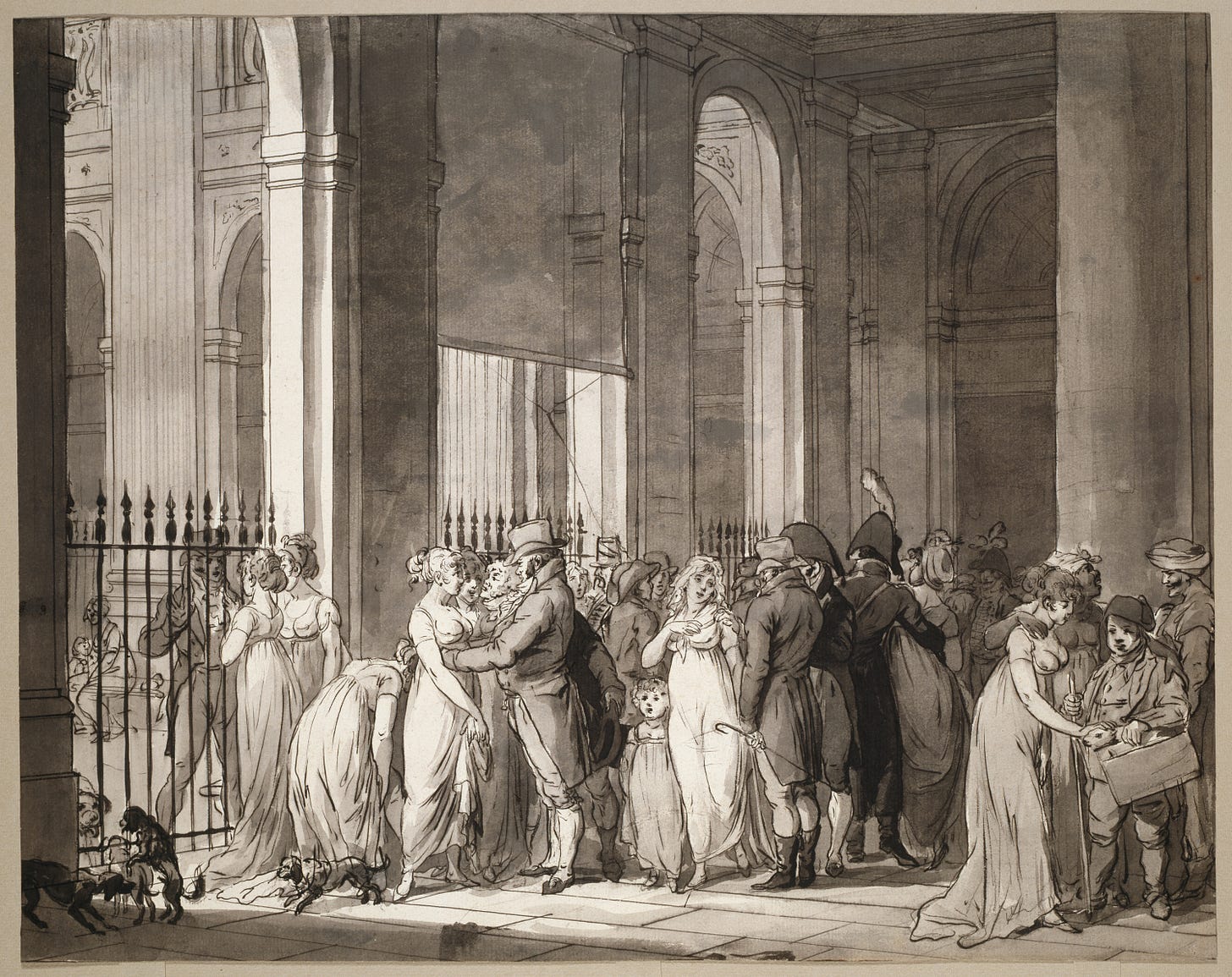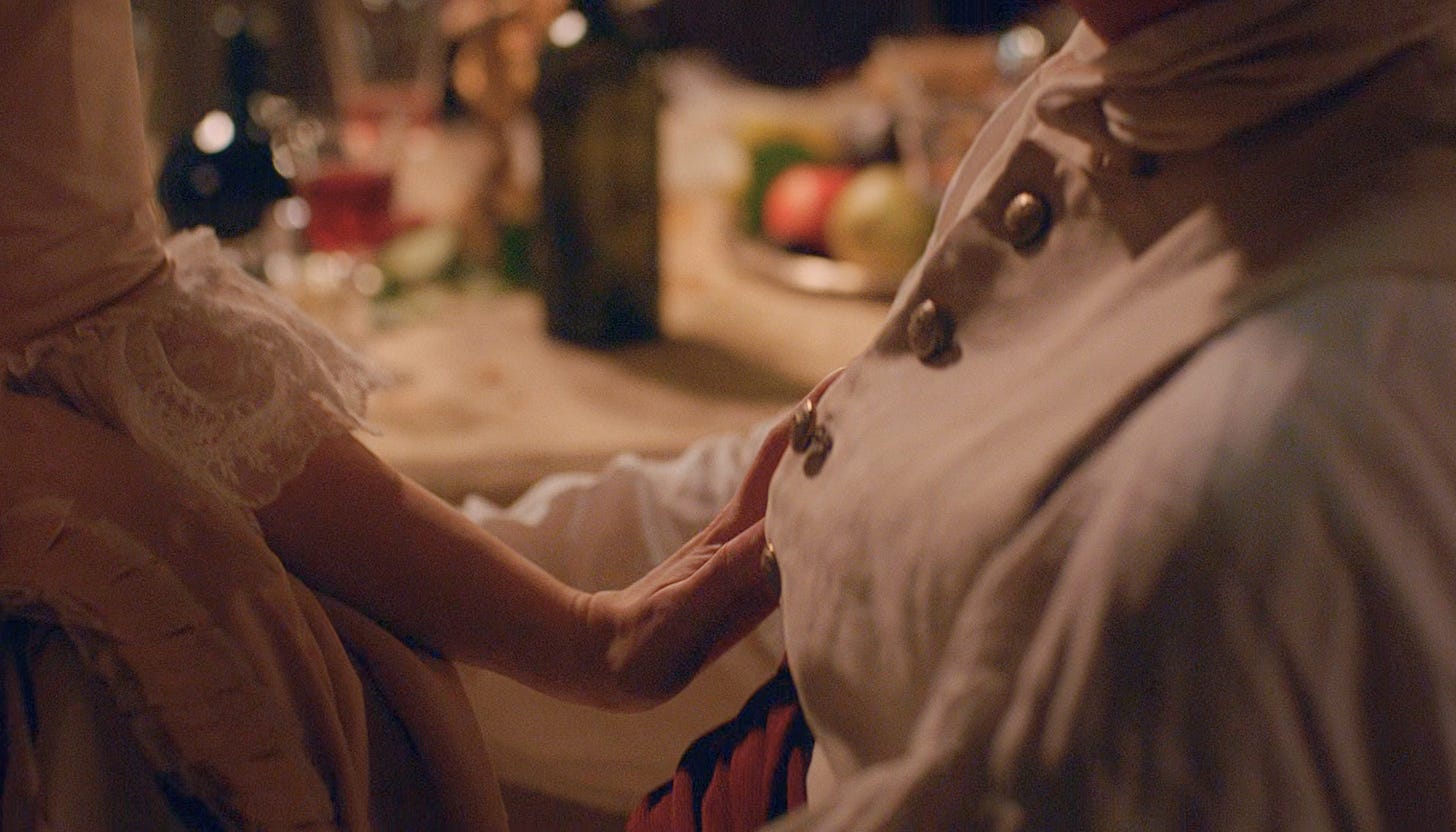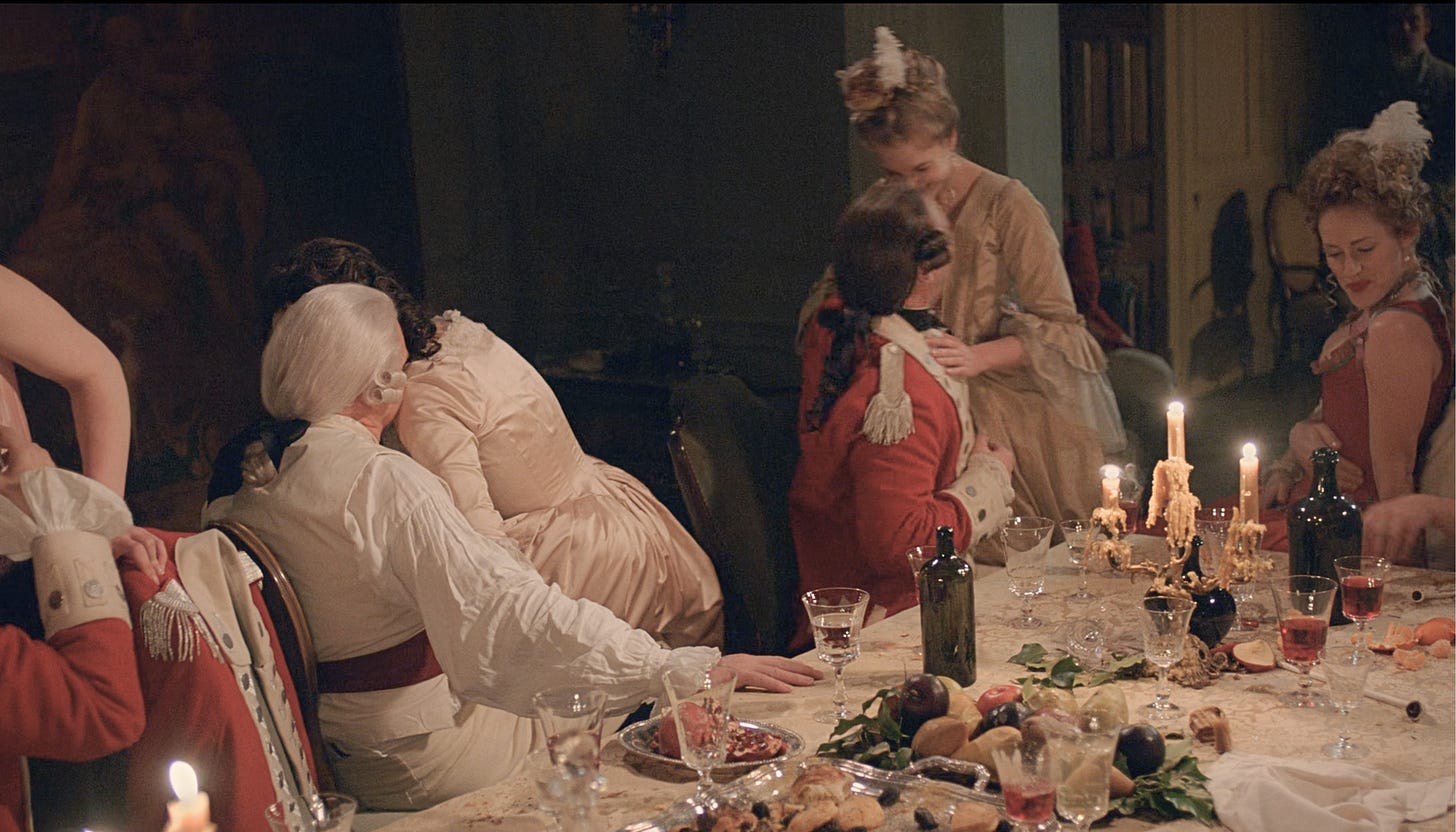The Price of Loneliness
The Art of Seduction - Part III. Morris pays for Company
⚠️ Content & Context Disclaimer
This Essay discusses Sexual Coercion, Prostitution, and the moral Contradictions of male Desire in the late 18th Century.
It includes historical Material that may be distressing.
It also contains Interpretations of Gouverneur Morris’s Diary suggesting he may have solicited Sex Work.
If my interpretation is correct, I condemn this Act in the strongest possible Terms.
This Text does not romanticize, excuse, or aestheticize sexual Exploitation. According to my ethical Understanding, “Sex Work” is a Term that, by its Nature, protects Perpetrators. I regard the Milieu as a Part of the Patriarchy built on systematic Coercion and Oppression — an Economy of Survival that dehumanizes and exploits. Those who in any way consume, purchase, or enforce it, are Perpetrators, regardless of Motive or Self-Awareness.
Ignorance does not absolve Guilt.
My Intention here is to question how a Man of Enlightenment and emotional Intelligence with a deep moral Understanding, who, contrary to his Environment, spoke out against the Oppression of the Weak, practiced Humanism and Charity, could participate in systemic Violence.
I study this Contradiction to expose it — not to absolve it. Because if my Interpretation is correct,
what Gouverneur Morris did, is unforgivable.
I. HEAD: Paid Company
Monday June 1st. 1789 — Employed this morning in Writing. (…) Dress, and Genl. Dalrymple, Mr. Jefferson, Mr. Davis and Mr. Short come to dine with me.
Sit after Dinner till about eight o’Clock.
I then take a Walk in the Palais royal and make acquaintance with a Saxon Girl, just landed from the Diligence to supply the Flesh Market of this Capital ; from Conversation with her I find that she works on Shares with the Matron to whose Hospitality and Protection she is now indebted.
Return Home and take Tea in which Repast the Girls of the House partake with me.
The eldest tells me she is very cold and appeals for the Truth of her Assertion to my friend La Caze. The youngest says little but gives me clearly to understand that she is not what her Sister pretends to be. The Weather this Day is rainy and disagreeable.1
After a long Day of Business and a Diplomatic Dinner Morris goes out for a solitary Walk through the Palais-Royal — at the Time a bustling Maze of Arcades lined with Cafés, Gambling Rooms (he had no Interest in) and Sex Workers.
He meets a young English-speaking Woman who has just arrived by Stagecoach (“voiture de diligence”). Fresh off the 18th Century Bus, she strikes up a Conversation with him and he learns about her Source of Income.
Morris then takes her Home with him.
What follows is a mild Description of the further Course of Events, recorded with dry Restraint. A semi-compromising Encounter — and for him, the most moral Way to buy himself some Company.
1. Gouverneur Morris’ characteristic moral Calculus
He decided not to take Advantage of the Girl who offered him her Services in his own Language, but he didn’t ignore her either, or leave her without Money. He found a Way to make the Transaction free of Sin — Charity disguised as a social Ritual.
Drinking Tea with two Sex Workers perfectly demonstrates this subtle Morrisian middle Ground between Compassion and Decency.
2. Gouverneur Morris’ moral Justification
Morris’ Use of “Hospitality and Protection” which the newly arrived British Woman receives from her Matron seeps with Irony. He notes in his Diary that the poor Woman is caught in an unfair System of Abuse. Bondage marketed as Benevolence.
Morris himself was still Months away from working his Way up to being allowed to serve Tea to his female Acquaintances at Court. By inviting two Girls to enjoy this then exorbitant Luxury at his Home, Morris temporarily reverses the whole Dynamic. He takes them out of the House, where they are forced to do the Unspeakable, to give them a Reprieve.
This kind of Empathy is deeply consistent with his innate undisguised outspoken Hatred of Dependency and Exploitation. He detested the Concept of People being “indebted” to anyone — morally, financially, or physically.
This shifts his Action away from Saviorism and the Hypocrisy of Christian Charity, [for the deeply religious Morris, a moral Crux, that is examined in more Detail in this Essay.]
Gouverneur’s Act wasn’t about Self-righteous “Saving” — he wasn’t trying to rescue anyone from a broken System. He operated within it, by practicing transactional Kindness, avoiding the Pitfall of cynical Indifference, within his own well-documented Framework of Morality, where Compassion and Pragmatism coexist.
3. Gouverneur Morris Documentation on the Art of Seduction
In this Encounter it is utterly safe to say, that he had no Intercourse.
He would have written it down. He always does. Even when he wants to obscure it, he drops a mythological or literary Reference or a euphemistic Line like “I yield to the Temptation” or “I commit a Folly.” Here he doesn’t.
Instead, he describes a small Choreography of Hints in Accordance with the Demands of the House. The older Woman plays with Words and Gestures, the younger Woman responds with a Glance and an ironic Reversal.
It is an Exchange of Signals, not a physical Event.
His Vocabulary remains purely observational and detached — “tells,” “appeals,” “gives me to understand”—are all cognitive, not physical. Words of seeing and hearing, not feeling. He registers, interprets, analyzes—and stops where Touch would begin.
That Restraint speaks for itself. He is a Witness, not a Participant. What other Men would consider Foreplay becomes a Study for him: a moral and social Experiment that he observes soberly, ethically distancing himself from it.
Accompanying Services of the 18th Century
In the male-dominated social Circles of the late 18th Century, post-Dinner Visits to Brothels or the paid Company of “Girls” were considered Part of the Ritual of Leisure — hardly any different from Gambling or Wine — and were not seen as a moral Transgression among the upper Classes.
Morris’s Reaction, however, is atypical. He doesn’t moralize, but he doesn’t indulge, either. He does not see the Encounter as an Adventure, but rather as a System: an economic and social Ritual that he dissects instead of losing himself in it.
Here, the Founding Father, later discredited as a Libertine, kept Temptation at Bay.
II. BODY: Defeat of Rahab
Wednesday June 3rd. 1789 — Employed this Morning in Writing (...) After Dinner take a Turn in the Palais royal. A Lady invites me from her Window to pay a Visit and I accordingly go up Stairs, but a nearer Approach convinces me that her Health has been injured by her Attention to the physical Necessities of her fellow Creatures.
I lament to her this Misfortune, which she denies but offers at the same Time the usual Securities. I decline to avail myself of her Goodness. It is just therefore that I should present her with something to buy Ribbands. It happens however that I am as unjust as I am ungallant.
To convince me of her Tenderness and render me more sensible to her attractive Graces she locks the Door and puts the Key in her Pocket. Her Reasons are excellent but not convincing and her Tone and Manner are rather vehement than perswasive.
I am very gentle but a little obstinate and ask her out of Curiosity whether she is acquainted with such a Thing as the Police.
Her Knowledge I find is equal to her Elocution. She has already the Honor of being registered in the sublime Archives of that mysterious Office, and with a Candor rare in more elevated Stations, the Means by which she obtains her daily Bread are there noted by her own Avowal. Doubtless Monsieur will not expose himself to the Scandale of an Affair of this Sort and that for a Trifle — ‘D’ailleurs c’est comme moi je suis obligée de payer pour la Chambre le Temps que j’y suis.’ — As it is not worth while to plead a Cause where there is no common Judge I look at my Watch, and having Time enough I determine to wait patiently the Event. Finding that I do not contest her Arguments the Lady expresses a Desire to know the Cause.
‘C’est que j’ai pris mon Parti, ma belle.’ — The french Vivacity gives Way as usual to the Nonchalence which they despise in themselves and respect in others. The Door is opened, and as I will not present her with Money she presents me with a Profusion of Expressions whose Excellence consists more in Energy than in Elegance.
Take some Ice at the Caffé and then go to the Club Valois of which I have been chosen a Member.2
This Time, Temptation calls down from an open Window on the second Floor.
Our Gentleman Empiricist accepts the Invitation.
Up close, Morris’ Physician’s-Eye cannot overlook what he notes with his usual polite Circumlocution: She showed visible Signs of venereal Disease.
Gouverneur’s medical Training, physical Self-Discipline, and the Memory of two serious somatic Traumas he barely survived, cool him off.
Rahab nevertheless offers him “the usual Securities”: those ritualized Assurances and Guarantees with which a 18th Century Negotiation between Body, Money, and Risk usually began:
1. Physical Security: Proof or Promise of Health
By the 1780s–1790s, venereal Disease was so widespread in Paris that Sex Workers were subject to periodic “visites médicales” — official Inspections by the “Police des Mœurs”.
Rahab invokes that bureaucratic Purity as a Selling Point.
But Gouverneur sees something else and wants to step back from the Deal.
2. Moral Security: Discretion, Privacy, and Reputation
In the Language of the Trade at that Time, “Security” also meant Protection from Damage to one’s Reputation. In a semi-public Setting such as this, the Assurance would have been standard Procedure for a Man of Morris’ Appearance.
No Witnesses, no Scandal.
But when he refuses handing out even a small Gratuity for no Reason, the Facade crumbles. Rahab locks him up and threatens to blackmail him by making the Incident public.
Thus, this Security too turns out to be nonexistent, prompting Morris’ Suspicion that this was her real Play, to secure her Livelihood.
3. Contractual Security: Assurance of mutual Benefit
Feeling exposed, Rahab changes Tactics: he must pay, she says, because she rents the Room for their Encounter at a Rate. Law-trained Morris immediately sees through this Scheme and ends it with a single Masterstroke of Calm:
he pulls his Pocketwatch.
A silent, flawless Sign of Power. The Symbol of his Self-Management, his Mastery over Time, Rhythm, Reason. Rahab doesn’t have one, so she loses her Composure and the Basis for her Farce. Morris, on the other Hand, regains his inner Balance.
“C’est que j’ai pris mon parti, ma belle” — “My Mind is made up, my dear.”
An elegant form of Determination: calm, polite, final.
Rahab’s Game falls apart and the Prison is unlocked.
Morris leaves the House unscathed, unpaid, unseduced.
And treats himself... to some Ice.
The Price of Freedom
At first Glance, this Story seems quite un-Morrisian: his Resistance to simply giving the Woman some Money, buying his own Peace by ending the Scene appears atypical. But his Refusal to pay, stems from neither Prudery nor Parsimony — and certainly not from moral Superiority. He acted completely true to his radical Empathy.
It was the Essence of Gouverneur Morris to take Principles seriously because they were meant to serve People, not the other Way around. That is why he made a strict Distinction between Law and Conscience; he followed the Former only when it wouldn’t contradict the Latter. Here, he knew no one comes to Harm if he didn’t pay. In Fact, he was more likely to harm both Parties if the Transaction had taken Place.
This moral Reflex runs like a scarlet Thread through his Life—the same Sense of the Boundary between Law and Justice that he upheld in the Creation of the Constitution.
Throughout the Constitutional Convention, he fought tirelessly for an Order committed to human Dignity rather than Power or Capital. He accepted necessary Concessions where they ensured Stability, but remained critical when the finished Constitution ossified, exposing precisely the Weaknesses he had forewarned of:
Corruption born of human Seductability.
So what looks like Frugality here is really Jurisprudence: He refused to pay Rahab for the Breach of Law by Coercion and Captivity — for the same Reason he would later pay dearly to free those from Captivity, whose sole Circumstances of Birth constituted a Breach of Law.
For Gouverneur Morris, Justice without Humanity was not Justice,
but an Abuse of Power.
III. HEART: And the Consequence of that, Folly.
Saturday April 18. 1789 — This Morning employed in Writing. Mr. Richards and Mr. Dariell dine with me and stay till nine oClock drinking. The Consequence is Inebriation and the Consequence of that, Folly. I walk in the Palais royal, am picked up and return Home at twelve, the Object of my own Contempt and Aversion. The Weather this Day has been variable but damp & unpleasant. In walking about the Palais royal I send to enquire if Madame de Chattellux is at Home and luckily she is not.3
That is all for an entire Saturday, less than two Months before Tea with the Girls and Rahab’s Window. One of Gouverneur Morris’ shortest Diary Entries ever.
A moral Earthquake that shakes his inner Architecture.
He drinks in Company, goes to the Palace alone, “am picked up” — not actively, not passively, just letting it happen, and the Result: Folly.
1. Self-Contempt
“Folly” in Gouverneur Morris’ moral Vocabulary is not flippant:
To him it is Sin’s secular Twin — the rational Man’s Word for outright moral Failure.
He does not say he feels Contempt and Aversion.
He is them. He embodies them.
As always, Morris turns Shame, Guilt, and Self-Contempt inward — objectifies himself, strips himself of Subjecthood. Dehumanization is the harshest Form of Self-Loathing he is capable of.
Only then comes the last Line — the real Blow:
he inquired if Madame de Chastellux is at Home. Fortunately, she was not —
but he was about to seek Sex with a Woman he respected, but did not love.
2. Grieving Borders
Baroness Marie-Brigitte-Caroline-Joséphine (née Plunkette) de Chastellux (1759–1815) was the Lady-in-Waiting to the Duchess d’Orléans and had been a Widow for only a few Months. [ Her husband, ] like Morris, was a Revolutionary in the American War of Independence and had died on October 24, 1788. Their Child was born on February 20, 1789.
And just ten Days after giving Birth, the grieving Widow placed her Infant in Gouverneur Morris’ Arms. It was an Act so intimate and domestic that it was completely unusual in the Etiquette of the Court.
While I hold him in my Arms: ‘Ah! Monsieur Morris, cet Enfant a bien des Droits sur vous.’ — ‘Oui Madame, aussi j’espère lui être de quelque Utilité.’ 4
“Ah, Mister Morris, this Child has already a Claim on you.”
“Yes, Madame, and I hope to be of some Use to him too.”
Shortly after, Madame de Chastellux immediately showed Jealousy when another Countess threw a Glance at Morris.
She tells me Madame de Rully is a Slut. I assure her that this Information gives me great Concern ; that I was becoming violently in Love with her and am totally palled by the Communication. Tout cela s’entend.5
Conversation this unrestrained was a strong Indicator that the Baroness’ Affection went beyond courtly Friendship. Morris knew very well that she would have given herself to him. But Madame de Chastellux was still wearing black.
According to the Custom of the Time, the Mourning Period lasted six Months, and it was only April 18. So on that Saturday, Morris would have been violating not only his own Principles, but also the moral and social Code of the Time and Court, whose Customs and Standards the Baroness herself was still teaching him.
Morris was on the Verge of not only urging a Widow still bound to Death toward Sin, but of profaning the Mourning that consecrated her Husband’s Memory — his Brother-in-Arms.
3. The self-aware Bachelor
Friday August 28, 1789 — Sit with the Ladies and as Mrs. Penn brings Matrimony on the Carpet I drop the Idea that I think it less probable that I shall form such a Connection now than I did ten Years ago. That I would not advise a Woman to marry an old Batchelor because they generally make but disagreeable Husbands.6
What appears like casual Small Talk here is Morrisian Self-Flagellation of the highest Order. Gouverneur cuts into his own Flesh and openly and honestly reveals he has given up. He had no intend of Marriage. And a Sexual Relation with no nuptial Prospect would have been a Betrayal of everything his Heart believed about Honor, Affection, and Duty.
His Self-Contempt was not just aimed at the abstract Shame of committing a Sacrilege, but also at his Knowledge that he had been willing to take that Step — and that Fate, not Virtue, had diverted him toward another Form of Transgression.
A Heart in Disarray
Suddenly, Tea with the Girls and the Window of Opportunity seem like Acts of Penance — Atonement without Pathos. Gouverneur Morris’s desperate Attempt to rewrite his own History.
In the HEAD, he orders his World — sets Boundaries, turns Need into Ritual, and dispenses Comfort in moral, measured Form.
In the BODY, he draws the Boundary upon himself: refusing where Health or Justice are at Risk, leaving the Scene without Gain, without Loss — a non-zero-Sum Game of Restraint.
And in the HEART, he yields — not to Passion, but to Intercourse without a Future; Proximity without Perspective; a deep Betrayal of himself.
The hard but lucid Morrisian Line emerges:
— No Power over the Weak
— No Commerce over Conscience
— … ?
What remains unanswered is the why.
Why did Morris, on that April Night, seek physical Closeness with Intent? What drove him to silence the Mind, follow the Impulse of his Body, knowing how dearly his Heart would pay the Price?
The Answer is the last Thing one would expect from the so-called “Playboy Founder” — “the Rake, who wrote the Constitution.”
👁🗨 To be continued in “The Art of Seduction - Part IV: Lessons in Love”
Notes and Index:
Davenport, Beatrix Cary. A Diary of the French Revolution by Gouverneur Morris 1752-1816 Minister to France during the Terror. George G. Harrap & Co. Ltd., 1939. p. 102.
ibid. p. 104-105.
Beatrix Cary Davenport’s Edition of the Gouverneur Morris Diaries is structured by Months, each uneven Page carrying its own Title. P. 105 she named “Defeat of Rahab” — a perfect Example of her unmatched Humor, far keener than that of any later Morris-Graphists.
In the Bible, Rahab, the Courtesan of Jericho, hid Joshua’s Spies and earned her Redemption. Morris’s “Defeat of Rahab” carries a Double Meaning.
On one Hand it is an ironic Reversal: the moral Victory of the tempted Man over the Archetype of Temptation itself. His Victory over Rahab’s Defeat isn’t carnal, but spiritual: the Sinner choosing Conscience over Appetite, Salvation over Indulgence.
On the other Hand, Rahab marks her Window with a scarlet Thread — a Sign of Faith that saves those from certain Death who see it and enter her Room. Here we find the perfect Inversion, which made me laugh out loud when I first read Davenport’s Header: she conjures the Image of Morris, following the scarlet Thread straight into a Prison, as the unbiblical Hero forced to fight the holy Rahab herself in Order to escape.
ibid. p. 44.
ibid. p. 2.
ibid. p. 36.
ibid. p. 200.
All Translations from French into English (unless stated otherwise) I conducted myself, in Cooperation with ChatGPT (OpenAI, GPT-5, October 2025).





